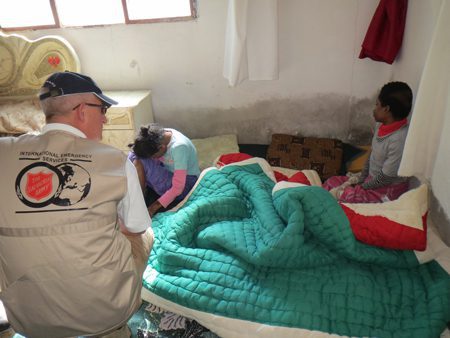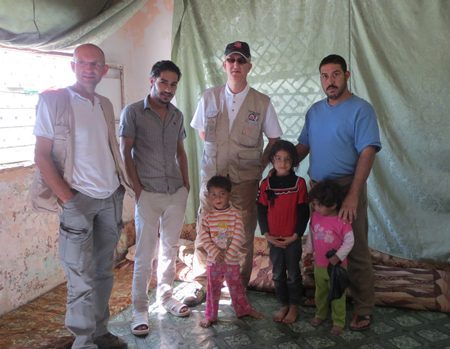
A Salvation Army International Emergency Services team in Jordan is working with the Lutheran World Federation (LWF) to assist refugees fleeing the ongoing conflict in Syria. The United Nations reports that more than two million people have fled Syria, with an excess of half a million people seeking safety in Jordan.
Nader Duqmaq, the head of LWF’s Jordan office, and his team are supporting Salvation Army emergency workers Damaris Frick, Major Barrie Sampson and team leader Major Henk Van Hattem with supplies and space in the LWF office in Amman.
Working in conjunction with local suppliers and the Jordan Hashemite Charity Organisation (JHCO)—an organization exempt from taxes and custom fees—the partners brought in supplies of gas stoves, gas cylinders, fleece training suits in different sizes and hygiene family kits (containing toothbrushes, toothpaste, shampoo, soap, sanitary towels, cleaning detergent, washing-up liquid, washing powder and hand sanitiser) for distribution. It was decided that the first distribution would be to the 200 families who are assessed to have the greatest need.
A second distribution program is being considered, with particular emphasis on preparations for winter. From mid-November temperatures will drop and experts are expecting a harsh winter. Typically, Syrian families in host communities live in uninsulated, unheated rooms, often without furniture, bedding or carpets. Further project ideas will be developed based on the findings during field visits and the information shared in the coordination meetings.
Major Barrie Sampson traveled with Salvation Army team members and representatives from LWF to Al Mafraq, about an hour’s drive from Amman. He says the refugee situation is causing many difficulties. “Al Mafraq has seen a large number of Syrians come into the city seeking refuge,” he writes. “Prices are high—forced up by the increased numbers now living there. Many Jordanians are finding it hard to maintain a decent living standard.”

In Al Mafraq The Salvation Army team met several families who had fled from Syria. Major Sampson reports: “Kishfa and her husband fled the Syrian city of Homs eight months ago in order to protect their family—they have four children and another due. They live in a garage-like premises and pay 100 Jordanian dinars (US$140) a month for rent.
“We also saw the 14-member Al Ewasha family, which is living in a broken down building, with carpets and curtains hung to cover the holes in the walls and keep some semblance of dignity. A curtain separates the sleeping area from the toilet. The youngest member of the family, a boy of about eight years, lost both parents in the Syrian conflict.
“He should be at school but there is no possibility for him to continue his education as there is no space in the schools, so he spends all his time with his grandparents.”
Sampson explains that local families are also being affected by the influx of people. “The Jaboors, a Jordanian family, live in two rooms at the rear of another residence with two severely disabled girls—one 15 the other 16—and a younger brother. Although the dad works as a guard they find it very difficult to manage due to the current economic situation in the city.”
The Salvation Army team expects to continue its work in Jordan for the foreseeable future, with plans under way to send in more team members as necessary.
See additional photos of The Salvation Army response at sar.my/iesjordan.
Report by International Emergency Services











